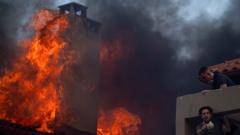Ahmed al-Shara's recent transition from rebel leader to president marks a pivotal moment in Syria's ongoing political evolution as the country grapples with its devastating past.
Syria's New Leadership: President Ahmed al-Shara's Vision and Challenges

Syria's New Leadership: President Ahmed al-Shara's Vision and Challenges
In a tumultuous post-civil war landscape, Syria faces significant questions regarding its future leadership and global alliances.
In a significant shift for Syria’s political landscape, Ahmed al-Shara, formerly a rebel leader allied with Al Qaeda, has become the country's new president following the ousting of Bashar al-Assad. In an exclusive interview with The New York Times, al-Shara discussed the wide-ranging challenges his administration faces, notably the urgent need for reconstruction after years of conflict.
With Syria’s economy crippled by prolonged civil war and sanctions, al-Shara aims to stabilize the nation while courting potential military support from Russia and Turkey. The complexities of foreign relations loom large, particularly as he seeks to redefine Syria's stance amidst ongoing tensions with Israel and the interests of neighboring Turkey.
The new president's past associations complicate his task of garnering trust from the West. Despite these hurdles, al-Shara remains optimistic about Syria's future, outlining his hopes to appeal for a lifting of sanctions and offering Syrian citizenship to foreign fighters who wish to support national rebuilding efforts.
This period represents a significant upheaval not just for Syria, but for the broader Middle Eastern geopolitics, as al-Shara navigates a precarious political environment riddled with competing factions and external pressures. His leadership brings both hope and uncertainty, as the country's citizens look towards a new era.

















